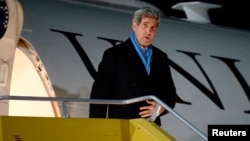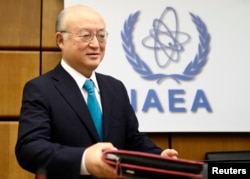U.S. Secretary of State John Kerry flew to Vienna Thursday to join talks on Iran’s nuclear program, just four days before the deadline.
Kerry and other Western officials said Iran still must make the strategic decision to accept limits on its nuclear program - a move that would contradict the so-called “red lines” set by its supreme leader earlier this year.
Iran is holding talks with the United States, France, Germany, Britain, Russia and China in Vienna this week in a push to reach an agreement by Monday.
Iran’s foreign minister, however, warned the United Nations negotiating team against making excessive demands.
And Iranian officials have made clear they want economic sanctions lifted immediately and permanently if there is a deal, while the six-nations representing the U.N. said that will be a gradual process.
Deadline at midnight Monday
Analysts have been skeptical that the gaps can be bridged by midnight Monday, as called for in the interim agreement signed a year ago and extended in July.
An unnamed U.S. official told Reuters news agency on Thursday that negotiators were talking about another extension, until March of next year.
But earlier Thursday in Paris, Kerry had said the opposite.
“We are not discussing an extension, we are negotiating to try and get an agreement,” he said.
Kerry said the “groundwork has been laid” for an accord through months of technical discussions and the drafting of what will be annexes to an agreement.
Still, Kerry said he would be willing to look at the possibility of an extension if the talks go to “the final hour.” And he said he hopes the parties can “define the finish line” during the coming days and try to cross it.
He also hinted at the potential benefits of an extension, saying the interim agreement has made the world safer.
Kerry defended the process, saying the talks have “come a long way in a short period of time.” He noted that just over a year ago there were no nuclear talks with Iran at all.
The international community has been working to ensure that Iran does not develop a nuclear weapon for 12 years, with little success until the current interim agreement.
Iran said it has no intention of developing such a weapon and wants nuclear technology for energy and medical applications.
But it has balked at the kind of intrusive inspections the United Nations wants, and insists on retaining an extensive nuclear fuel enrichment program, which could be used to build a bomb on short notice.
IAEA says Iran is stalling
Meanwhile, Yukiya Amano, head of the U.N.'s International Atomic Energy Agency's (IAEA), said Iran has again failed to provide explanations about suspected atomic bomb research.
As one of the conditions to end economic sanctions, the P5+1 said Iran must stop stonewalling the IAEA's 12-year-old investigation into allegations that Iran may have worked on designing an atomic bomb.
Amano made clear the agency was still far from satisfied.
“We are not in a position to provide credible assurance about the absence of undeclared nuclear material and activities in Iran, and therefore to conclude that all nuclear material in Iran is in peaceful activities," he said.
'Too far apart'
Mark Fitzpatrick follows the Iran talks for the International Institute for Strategic Studies.
“I don’t think there’s much possibility that a deal can be made in the time remaining," Fitzpatrick said.
"They’ve been too far apart. The most likely outcome is that the talks continue. If the talks break down and the situation reverts to square one, with more sanctions, and more centrifuges, more enrichment, neither party wants that," he said.
There are conflicting views on whether an extension would benefit Iran or the West, but Fitzpatrick said, overall, reaching the necessary compromises will not get easier.
Some material for this report came from Reuters.





